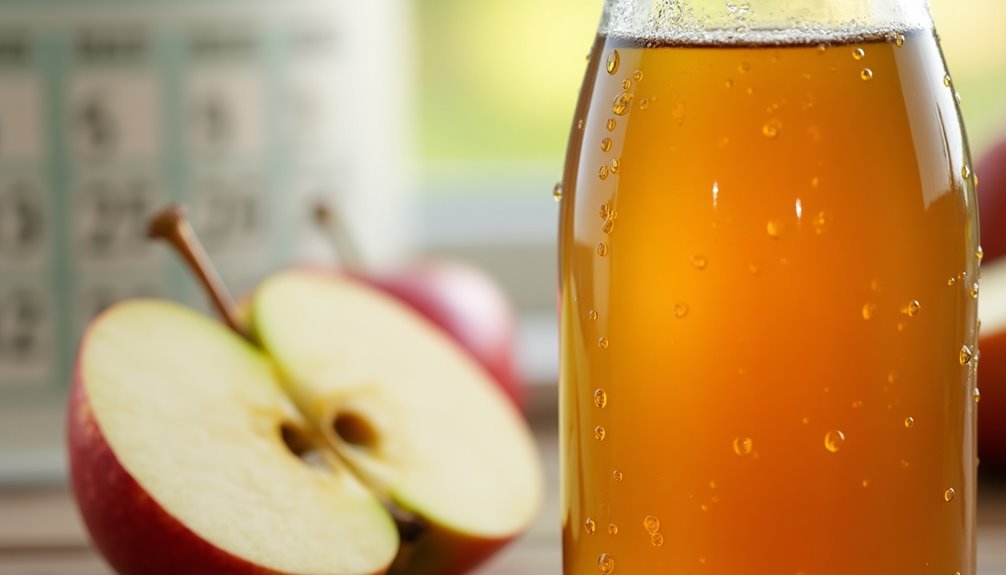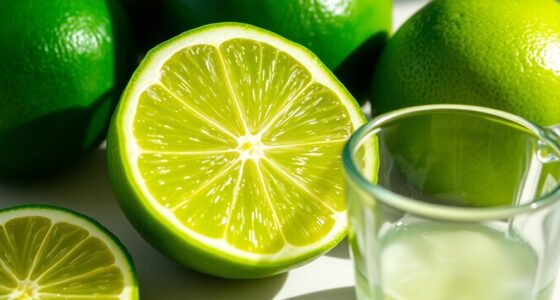Opened apple juice lasts about 7 to 10 days in the refrigerator. If you have cold-pressed juice, make sure to drink it within 2 to 3 days for the best taste and safety. Always store your juice in an airtight container to keep it fresh, and don't leave it at room temperature for more than 2 hours. If you notice any changes in color, smell, or taste, it's best to toss it. There's more to know about keeping juice fresh!
Key Takeaways
- Opened apple juice typically lasts about 7 to 10 days when stored in the refrigerator.
- Cold-pressed apple juice has a shorter shelf life, lasting only 2 to 3 days after opening.
- Always store opened juice in an airtight container to limit exposure to air and bacteria.
- Signs of spoilage include changes in color, texture, odor, or taste, indicating it is unsafe to consume.
- To ensure freshness, consume store-bought apple juice within the recommended time frame and keep it chilled.

Have you ever wondered how long your apple juice stays fresh after you pop that seal? It's a common question, especially if you love sipping on that sweet, refreshing drink. Once you crack open a container of store-bought apple juice, you need to be mindful of its shelf life. Generally, opened apple juice can last about 7 to 10 days when properly stored in your refrigerator. However, there are a few details you should consider to keep that juice tasting its best.
First, let's talk about the differences in shelf life among various types of apple juice. If you're dealing with canned apple juice, you should consume it within one week for optimal freshness. Cold-pressed apple juice, on the other hand, has a much shorter shelf life. After you open it, you can expect it to last only about 2 to 3 days. So, if you've got a bottle of cold-pressed juice sitting there, it's best to enjoy it sooner rather than later.
To maximize the shelf life of your opened apple juice, storage is key. Make sure to transfer it into an airtight container if it isn't already. A tightly sealed container will help limit exposure to air and bacteria, which can lead to spoilage. Always store your juice in the refrigerator, where it can stay cool and fresh.
Remember, if you leave opened apple juice at room temperature for more than 2 hours, it becomes unsafe to consume. Bacteria thrive in warmer conditions, so it's essential to keep that juice chilled.
As you sip on your apple juice over the days, keep an eye out for signs of spoilage. If you notice any changes in color, texture, or smell, it's best to err on the side of caution. Consuming spoiled juice can lead to stomach issues, and nobody wants that. A foul odor or a strange taste are usually telltale signs that your juice has gone bad, so don't ignore them.
If you want to enjoy your apple juice for as long as possible, always check the expiration date before you buy it. Even unopened juice can spoil if it's been sitting on the shelf for too long. When you find a fresh bottle, remember to chill it right away after opening, and plan to drink it within that 7 to 10-day window for store-bought varieties.
Frequently Asked Questions
How Long Is Apple Juice Good for After Opening?
When you open a container of apple juice, its freshness starts to decline.
Generally, you should consume it within 7 to 10 days if you store it in the fridge. If it's canned, aim to drink it within a week for the best taste.
Cold-pressed varieties tend to spoil faster, lasting only 2 to 3 days.
Always check for any off smells or discoloration before enjoying your juice to ensure it's still good.
How Long Does Juice Last in the Fridge After Opening?
When you open juice, it generally lasts about 7 to 10 days in the fridge.
However, if you've got cold-pressed juice, try to drink it within 2 to 3 days for the best taste.
Canned juice can stay fresh for up to a week after opening, too.
Just make sure you seal it tightly after each use and check for any signs of spoilage before you enjoy it.
How Long Is Martinelli's Apple Juice Good for Once Opened?
Did you know that Martinelli's apple juice can last up to 2 years when unopened?
Once you crack it open, though, you should consume it within 7 to 10 days. To keep it fresh, store it tightly sealed in the fridge.
Always check for any off smells or discoloration before drinking. If you notice those signs, it's best to toss it out and get a new bottle.
Enjoy your juice while it's good!
How to Tell if Juice Has Gone Bad?
To tell if juice has gone bad, start by checking for mold or discoloration; these are clear signs of spoilage.
Give it a sniff—if it smells sour or like vinegar, it's time to toss it.
Look for cloudiness or bubbles, which indicate fermentation.
If the container's bulging or expanding, don't hesitate to discard it.
Regularly inspect for off-odors or floating particles, as these can also signal that the juice is no longer safe to drink.
Conclusion
In conclusion, once you crack open that bottle of apple juice, you’ve got about 7 to 10 days to enjoy it before it starts to lose its freshness. Keeping it refrigerated is key to extending its shelf life. So, don’t let it go to waste—make the most of it while you can! Just remember, it’s best to drink up before time runs out, or you might find yourself in hot water with a sour sip. Additionally, if you’re curious about the health benefits of apple juice, it’s worth noting how apple juice affects digestion. The natural sugars and fibers found in apples can promote a healthy gut and aid in digestion, making it a refreshing choice for your meals. So, not only should you savor that delicious taste, but you can also enjoy the benefits it brings to your digestive health while it’s still fresh!
Cindy thoroughly researches juicing trends, techniques, and recipes to provide readers with practical advice and inspiration. Her writing style is accessible, engaging, and designed to make complex concepts easy to understand. Cindy’s dedication to promoting the advantages of juicing shines through her work, empowering readers to make positive changes in their lives through the simple act of juicing.











